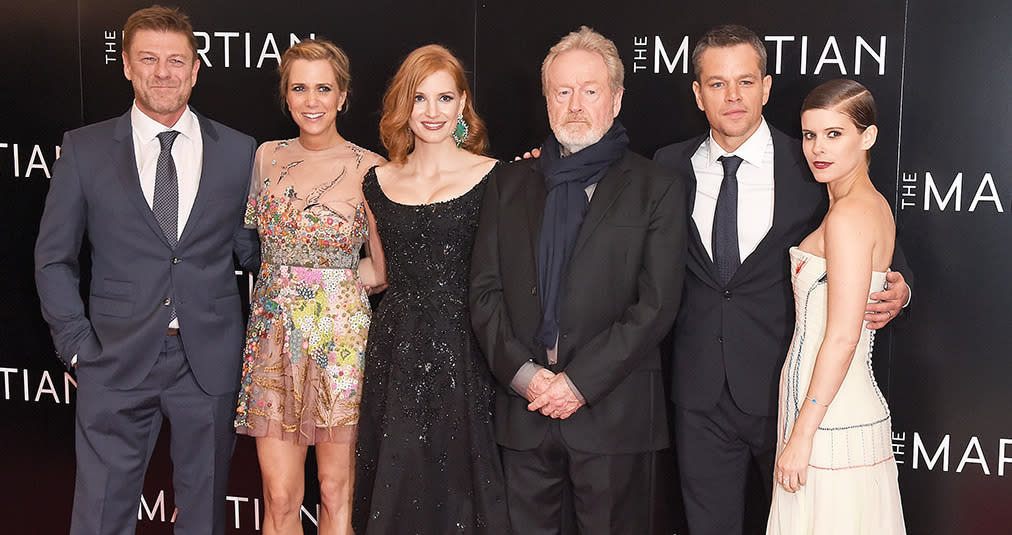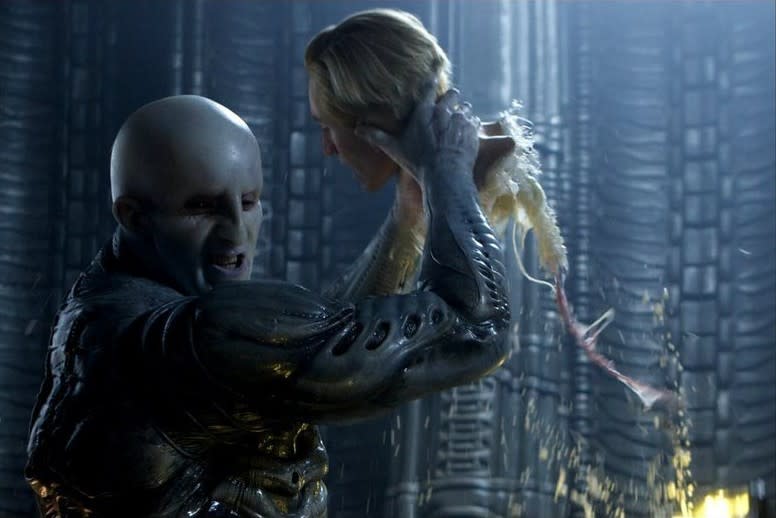Ridley Scott on Bringing 'The Martian' to Life and How He's Reviving 'Blade Runner'

The cast of ‘The Martian’ at the film’s premiere (Getty Images)
With 1978’s monster-thriller Alien and 1982’s neo-noir epic Blade Runner, director Ridley Scott helped set the tone for more than 30 years’ worth of dark, gritty, and thought-provoking science-fiction films. After three decades of working on everything from historical epics to crime capers, he returned his roots with 2012’s Alien prequel Prometheus, and now, the 78-year-old British filmmaker continues his own person sci-fi revival with The Martian, the highly anticipated adaptation of Andy Weir’s hit 2011 novel.
The film stars Matt Damon as Mark Watney, a botanist and astronaut who’s assumed to have died on Mars after a wild storm forces his crewmates to abort their mission and head back to Earth. But Watney manages to survived — and once he wakes up, he has to find a way to survive on the barren planet and also contact NASA, which must decide how to bring him home. What follows is a mix of ingenuity, perseverance, and fervently focused determination — all traits that Scott himself has demonstrated on such films as Gladiator, Black Hawk Down, and Thelma & Louise.
Scott spoke with Yahoo Movies in New York on Monday to discuss The Martian, his Blade Runner follow-up, the Prometheus sequel, and more.
A big plot point in the film is Matt Damon’s character, Mark Watney, working to make water on the barren planet. But, as it turns out, NASA just announced that they actually found water on Mars.
I knew that months ago. When I first talked to NASA, we got into all kinds of stuff and I said, “So I know you’ve got down there massive glaciers.” And he said, “Yeah, that the massive white thing [on the surface of Mars] that gets covered with dust, we think that’s ice.” And I said, “Wow! Does that mean there was an ocean? Are we right now what Mars was 750 million years ago?” And they went, “Uh, good question.” So they want to go up there and find out.
The Mars you depict is so vast and barren. You shot in Jordan and Turkey, but how much of the Mars set did you build physically, and how much of it was green-screen?
The desert [in Jordan] was virgin, [and] the rocks are spectacular — I’d compare it to Monument Valley. It was absolutely marvelous. We hit it great because it was only 70 degrees as opposed to 120 [degrees]. It looked great, but I wanted it to be more terracotta red. I love to color grade [adjust the color of the picture on screen]. It’s the final act on my film. I literally sit there with a technician artist and we grade the g—amn movie. It’s a lot of knobs and twisting. You see the whole thing come alive. And by then, I’ve put in all the skies. Every sky shot has a trail of dust going through it.
Do you like to build as much as you can still?
I love to. Because I’m still an art student at heart [Editor’s Note: Scott studied at the Royal College of Art].
Could most filmmakers get away with making these kinds of elaborate real sets these days, or is it just too expensive?
Provisionally, [lowering costs with green screen] was the intention. Now digital effects are more expensive, in my opinion. There’s a lot of fumbling and muttering about going back to building the sets. I build as much as possible. On Gladiator I built 40 percent of the stadium, full-scale. And I saved money by not building the top tier of the stadium. We digitally went in and mapped it, used wireframe to fill in the fifth tier. It’s painting digitally.
Our stage in Budapest [for The Martian] was bigger than Pinewood. We had a brand new green screen going 65 feet up to the gantry. I put in a habitat there, I put in a rover there, and I’d already positioned them in the actual Wadi Rum against the rocks. So the guys have sampled the desert with tracking shots in the whole valley. So if he walks out one way, they can track him and build the whole [desert from footage].
Have you considered using virtual reality for a film?
You have to go for it. You’ve got to, you’d be stupid not to.
Would you like to do one?
I’m in one now — I shouldn’t say which [movie]. People say, “You can’t have the theater with a room full of people with helmets on.” Therefore, it points to me as probably a domestic experience, where you can sit in a room like this and [walk] through a whole universe by yourself, and then pass it on to your family. Or get two or three helmets and do the same thing. Though you’d walk into each other, so you better go in another room.
Are you doing it for a feature film?
They’re already doing some for The Martian. A little late, but it’ll come out [in the form of a 15-minute Oculus Rift experience]. The effects from The Martian are done from the point of view of the astronaut. It’ll be, what you can do to save your life? I think people are very curious about the film, and the reaction has been very good. It’s got an emotional ending, which is optimistic, which I think in today’s world plays very nicely. I’m very British and go for a dark ending, and I pay the price.
Like with Blade Runner.
I paid the price for 27 years. Now we’re making number two, because apparently now it’s a work of art. Pffff.
Will you have final cut on Blade Runner 2?
Oh, yeah. I mean, I always have final cut on everything, really. Partly because I’m very user-friendly. I always believe when you’re given X amount of money by someone to f–k around with and make a movie, you can’t draw lines in the sand. If I was an investor and you did that to me, I’d remove your ankles. So don’t do the auteur s–t. I respect the guy for giving the money and I respect the studio for saying, “Yeah, you want to do this, here we go.”
You’re doing four Prometheus movies. Do you want to do the same with Blade Runner?
Listen: Everyone else is, so why not? I love to work. The French say, “Work to live,” and I live to work. I’m very lucky to have a job that I adore. All my kids do the same thing. Some of it’s trying, but it’s like being in professional sport. It’s so competitive [that] you better keep bouncing the ball. You can’t rest.
Ryan Gosling is a great choice for Blade Runner 2.
Yeah, and I got Harrison back. Because Harrison said, “Meh,” and I said, “No, read this.” And I think he said, “This is the best script I’ve ever had.” We’ve been working on it for a couple of years.
You once said he’s a Replicant in the first one.
Of course he’s a bloody Replicant! He’s going to have to admit it.
So don’t Replicants die after four years?
I’m not going to tell you. You’ll have to see the story. It’ll all make sense.
And you’re going to hand over the franchise to Ryan Gosling after that.
Yeah, yeah.
What year will it be set in?
It was 2017, so coming back it’ll be 2047, roughly. As young as you can play Ryan Gosling. He’s 34, but he looks 27 when he’s doing his push-ups. So maybe 2050.
And Prometheus 2 will be a continuation of the story?
Of course. Have you ever read Paradise Lost, by Milton? In a funny kind of way, it’s an interesting basis for the darkness of [Prometheus 2]. Where the good-looking guy, who is evil as s–t, gets all the girls and goes to the nightclubs. The other guy, who is not quite as good-looking, is boring as hell and stays home. So in a funny kind of way, we used that as the basis for it, it’ll be Alien: Paradise Lost. Which is very spooky, because it continues after the last one, where Elizabeth Shaw [Noomi Rapace] says, “I wanna go where they came from.” And you’ve got Michael Fassbender in two parts, so she’ll slowly put him back together. They will go to the world of the Engineer.
To the core of that planet.
That’s where they’re going to go. They will find out who would design such an awful bio-mechanoid creature, like a massive piece of bacteria.

You often put out director’s cuts on the movie’s DVD. Do you think your 4-½ hour cut of Exodus will ever see the light of day?
Yeah. Sometimes the cut that goes out is it. I deeply regret cutting 17 minutes out of Kingdom of Heaven, because it was the whole side story for Eva Green’s character, but sometimes you think, That’s it, it works. There will be another, longer version of The Martian, but only [by] 15 minutes. It’s not fat, it’s scenes that are real that were only cut out because you didn’t need them. But they were good scenes. I hate when they put out a DVD and it’s just bulls–t, it’s fat and longer shots. It’s boring.
So will we see that for Exodus [which was plagued with controversy over a cast filled with white actors playing North Africans]?
I think we got into this ridiculous thing with [one critic] who was claiming to represent the black community. I am apolitical — as far as I’m concerned, everyone’s my friend. She was [asking], “Why wasn’t Moses dark [in the film]?” And I said, “Given the cost… Denzel Washington’s too old.” And I’d work with Denzel in a flash if he could play 30 or 32. I think my man [Christian Bale] just about got away with that… But we got into a race thing that was just bizarre. I said to the critic, “Were you there? No. How do you know what he looked like? Was he African-dark? Or was he Arabic, olive and swarthy? How do you know she was Ethiopian? Because it said so in the Bible?” I think we got into a lot of silliness there.
Do you think that hurt the box office and critical reception?
Oh, definitely. But I think the danger is, when you climb up there and say, “It’s about religion,” people tend to not to want to learn anything. They just want to be able to go there and be entertained. So that’s why I thought we’d give them everything I could to make that story evolve as to what may have happened to him. I like the fact that I started Moses off as an agnostic, which in fact he was.
So, you’ve made Alien but also The Martian, where Watney is the only living organism on the planet. Do you believe there are aliens out there, in real life?
Yeah, of course. It’s kind of ridiculous to think not. Even though Carl Sagan — I met Carl Sagan when I had just finished Alien and we were in Pasadena at the Planetarium. The week it was opening, Carl Sagan was attending, and he came up to me with a glass of champagne, and he said, “Of course there will be no aliens in either your or my lifetime.” And I said, “Lighten up there, Carl. It’s a movie.”

